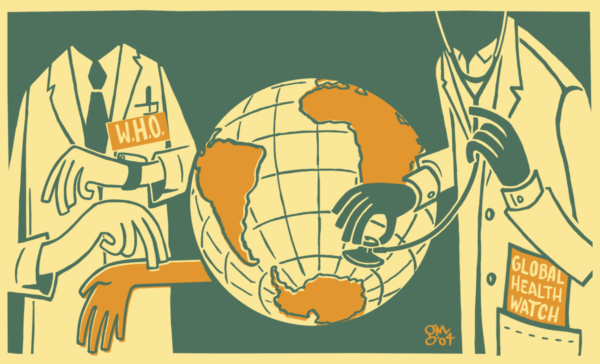Governments have faced difficult decisions over the past months, but the decision to remove unnecessary barriers to accessing COVID-19 health technologies like vaccines, diagnostics and treatments should be an obvious one. This decision is currently under debate among member states of the World Trade Organization, who are considering a proposal to waive global intellectual property rules for COVID-19 health technologies to combat COVID-19.
What is the waiver proposal?
On October 2, 2020 India and South Africa tabled a proposal to the World Trade Organization’s Council for Trade-Related Intellectual Property Rights asking member states to waive a range of intellectual property (IP) measures on health technologies related to COVID-19 ‘until widespread vaccination is in place globally, and the majority of the world’s population has developed immunity’.
The proposal, if accepted, would allow countries greater flexibility in choosing to deny granting of patents or other IP on COVID-19 diagnostics, vaccines, and other technologies such as personal protective equipment.
Currently, member states of the World Trade Organization must provide IP protection and enforcement across a range of measures, including at least 20 years patent protection. During this period the patent holder has a monopoly on a product and cheaper generic versions cannot enter the market. Least developed countries (LCDs) have an extension on IP for pharmaceuticals until 1 January 2033 or when they ‘graduate’ out of the LDC category if earlier.
India and South Africa’s proposal highlights the barrier that IP can serve to technology transfer and manufacturing of COVID-19 health technologies, and provides an explicit avenue for the removal of IP barriers. The proposal has received widespread support from more than 30 low and middle income countries, over 400 global health civil society organisations, the World Health Organization (WHO), UNAIDS and UNITAD.

How can the waiver facilitate access to health technologies?
Medicines and vaccines under IP monopolies are increasingly prohibitively expensive. This was illustrated during the HIV/AIDS epidemic where the original monopoly price for HIV/AIDS drugs at $10,000 per patient per year was unaffordable not only for low and middle income countries, but for patients in high income countries too.
Global demands for affordable access to HIV/AIDS treatments were the catalyst for a 2003 waiver at the World Trade Organization which established a mechanism for countries producing generic medicines to supply to other countries who lacked manufacturing capacity to produce the medicine themselves.
IP barriers to access have been laid bare once again in this pandemic. Countries are experiencing delays to diagnostics and lifesaving technologies, personal protective equipment, promising treatments under patent, and numerous patent filings on vaccine candidates. For example, Medicines Sans Frontiers has documented patent barriers leading to shortages of testing kit reagents, ventilators, and N95 respirators across various countries.
As countries commit billions of dollars of public funding to the development of promising COVID-19 vaccines, global health organisations are supporting measures that remove IP barriers. Winnie Byanyima, Executive Director of UNAIDS argues that “we cannot repeat the painful lessons from the early years of the AIDS response, when people in wealthier countries got back to health, while millions of people in developing countries were left behind.”
Part of the wider problem for access to COVID-19 vaccines is an emerging inequity in advance purchasing agreements with promising candidate owners. Oxfam shows that a select number of high income countries, representing 13 per cent of the world’s population, have secured 51% of COVID-19 vaccine candidates through these kind of agreements. A recent Nature article reveals that the UK has pre-ordered enough vaccines for 5 doses per person, while allocation to low and middle income countries is less than 0.2 people per capita.
The WTO proposal is in response to lack of commitment to the WHO’s COVID-19 Technology Access Pool (C-TAP), launched in May to encourage the voluntarily sharing of IP, technologies and data to support global manufacturing and scale up of COVID-19 technologies. So far, no pharmaceutical firm has committed to sharing its IP and technologies in the pool, prompting India to push for the waiver at the WTO.
At the recent 16th October meeting of the WTO TRIPS Council, several high income countries including the United States, United Kingdom, Canada and Australia, did not support the waiver proposal. Informal consultations are now underway in advance of the next TRIPS Council meeting in December.
There are several arguments in support of the COVID-19 waiver for all countries. Quicker access to a new vaccine or treatment around the world would; facilitate faster global economic recovery through improved trade and ending of lockdowns; benefit health security to mitigate the spread of this highly infectious disease across countries; and, most importantly, save lives and reduce COVID morbidity for everyone regardless of the country they live in. The choice countries and WTO is making is simple – to prioritize people’s health, or profits.
About the authors:
Belinda Townsend is a Research Fellow in the School of Regulation and Global Governance at the Australian National University. She works on the political economy of health and health governance.
Jordan D. Jarvis is a Doctor of Public Health candidate at the London School of Hygiene and Tropical Medicine. Her research interests include health policy and governance, access to medicines, and the political economy of non-communicable disease treatment and prevention.
Conflict of interest:
We have read and understood the BMJ Group policy on declaration of interests and declare the following interests: Belinda Townsend has represented the Public Health Association of Australia on matters relating to trade and health. Jordan D. Jarvis is funded by the Canadian Institutes for Health Research (CIHR). CIHR had no role in this article.
Handling Editor: Soumyadeep Bhaumik